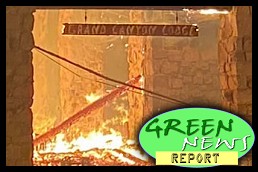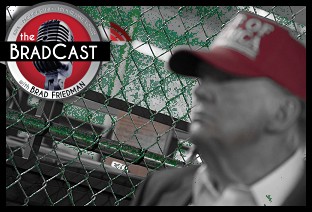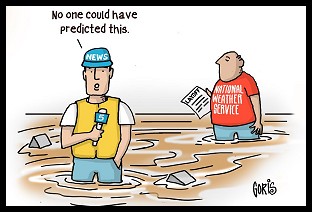 In the run-up to the 2012 Presidential Election, as Superstorm Sandy was bearing down hard on the East Coast, we wrote quite a bit (both here and at Salon) about how flooding and, specifically, power outages in several states that rely almost exclusively on electronic voting systems, could cripple the integrity of elections in a number of them.
In the run-up to the 2012 Presidential Election, as Superstorm Sandy was bearing down hard on the East Coast, we wrote quite a bit (both here and at Salon) about how flooding and, specifically, power outages in several states that rely almost exclusively on electronic voting systems, could cripple the integrity of elections in a number of them.
Ultimately, among the hardest hit of those northeastern states was New Jersey, which, shamefully, still forces almost all of its voters to cast their ballots on 100% unverifiable electronic touch-screen systems.
On the weekend before Election Day, as water was rising and power was out across much of the eastern part of the state, NJ's Gov. Chris Christie and Lt. Governor Kim Guadano issued an unusual, emergency order, allowing for the use of early voting to ease the crush on Election Day in areas where some polling places would be shut down to due flooding, and for the use of paper ballot voting in precincts where power was still likely to be out as of Election Day.
We applauded those emergency measures at the time, particularly as the chances for voters to actually have their votes counted accurately and transparently could only increase with the use of hand-marked paper ballots in a state which has had nothing but disasters over the years with their oft-failed, easily-manipulated touch-screen voting system.
However, at the same time Guadano was announcing those emergency measures, she also --- without bothering to consult with election officials around the state --- tossed in one other emergency order [PDF] which, as we warned at the time, was likely to be a terrible mistake.
Guadano ordered emergency Internet Voting --- of a sort --- by allowing for voters displaced by the storm (and it would be left up to election officials' discretion to determine which voters were or weren't "displaced") to cast their ballots via email or fax.
We now know, thanks to a new report from the Rutger's School of Law [PDF], that, indeed, NJ's experiment with voting over fax and the Internet was a disaster, one that led to tens of thousands of unauthenticated votes in 2012, and which hasn't hasn't been reported by the media...until now...
Steve Friess at Al-Jazeera America broke the story last night, with tremendous coverage, in advance of the release of the report today.
The short version is that while some voters were allowed to print out a copy of their ballot under the ill-considered emergency measures, to be scanned and sent in via email or fax along with a waiver releasing their right to a secret ballot, they were also required to send in a hard paper copy of that ballot via snail mail for verification later. Ballots sent via email or fax were not to be counted as part of the official tally unless and until they were compared days after the election with the mailed-in copy.
"That step exists to prevent hackers from easily intercepting email sent to a county address," Friess reports. "Since the emailed votes comprise two documents, the waiver and the ballot, cybersecurity experts say it's easy to replace the ballots with ones that show other vote choices. Unless voters mailed in their paper ballots to be compared, the board of elections would never know something was awry."
According to the Rutgers report, headed up by law professor and longtime NJ election integrity advocate Penny Venetis, in many cases, those hard copies were never actually compared with the original electronically delivered ballots. Worse, many of those hard copies never actually arrived at election headquarters, either because voters didn't realize they had to mail them in or for any other number of (potentially more nefarious) reasons.
The e-votes, however they arrived at election headquarters --- as cast by actual voters or not, who knows? --- were nonetheless counted as official votes and included in final results around the state anyway.
"In New Jersey, nobody has an exact count of how many votes were cast via email or fax --- which is only one part of the problem with what actually happened --- but everyone agrees the number is somewhere north of 50,000," Friess reports.
One election official at the time described the electronic delivery option as "simply a nightmare turned upside down, then inside out and dropped in our laps."
Chris Christie ultimately declared the "Internet Voting" experiment a "success" immediately following Election Day, even as tens of thousands of paper ballots had yet to be received by election officials via snail mail, and the results of dozens of races across the state remained "too close to call"...
The Rutgers documents show county officials openly admitting they disregarded this step. A Morris County official wrote in a letter to Venetis, of the Rutgers team, that hard copies of voted ballots "were not compared to faxed or email ballots for consistency of voting" and that "any ballot that was not received via hard copy ... was counted."
It may be impossible to tease out which races, if any, would have turned out differently had legions of votes been discarded for lack of the complementary paper ballots. In the immediate aftermath, with so much physical chaos in the state, almost nobody asked for recounts. Retired cop Rusty Chew, a 58-year-old first-time candidate for mayor of Cape May, was winning on Election Day but lost by 12 votes after the absentee votes were counted. He shrugged it off, returned that Friday to his post as a volunteer firefighter and spent the weekend bass fishing. Family and friends urged him to ask for a recount, but he says he "didn't want to seem like a sore loser." Also, he couldn't imagine any reason why the votes would have been miscounted. "You just trust that these things are done on the up-and-up," he says.
And, of course, as we have explained at The BRAD BLOG for years, there is never any reason to simply "trust" in election results. That's why transparent and public oversight of vote casting and, specifically, tabulation, is so crucial. Nobody should ever have to simply "trust" anything in regard to elections, as the very best election officials in the country will tell you, if you bother to ask them.
Friess goes on to note:
See Freiss' terrific report for more on that disaster, and for the continuing attempts by some, even now --- despite similar and worse disasters and continuing warnings from just about every independent computer scientist and security expert in the world urging against it --- to institute unsecure Internet Voting across the country, by hook...or by crook.
Perhaps such unilateral, and apparently illegal schemes are just one of the reasons, to quote Gov. Christie recently, he'd like to have Republicans in control of "voting mechanisms" in a number of key states during before the 2016 Presidential election.
(Snail mail support to "Brad Friedman, 7095 Hollywood Blvd., #594 Los Angeles, CA 90028" always welcome too!)
|


 CO Election Clerks Block White House Plot to Breach Voting Systems: 'BradCast' 7/17/25
CO Election Clerks Block White House Plot to Breach Voting Systems: 'BradCast' 7/17/25 'Green News Report' 7/17/25
'Green News Report' 7/17/25
 If 'Superman is the Story of America,' No Wonder MAGA Hates Him: 'BradCast' 7/16/25
If 'Superman is the Story of America,' No Wonder MAGA Hates Him: 'BradCast' 7/16/25  Trump IRS Agrees to Allow Churches to Endorse Political Candidates. Are All Nonprofits Next?: 'BradCast' 7/15/25
Trump IRS Agrees to Allow Churches to Endorse Political Candidates. Are All Nonprofits Next?: 'BradCast' 7/15/25 'Green News Report' 7/15/25
'Green News Report' 7/15/25 Repub Support for Immigrants Skyrockets Amid Trump's Crackdown: 'BradCast' 7/14/25
Repub Support for Immigrants Skyrockets Amid Trump's Crackdown: 'BradCast' 7/14/25  Sunday 'Totally Predictable' Toons
Sunday 'Totally Predictable' Toons Democracy STILL Our Best Way Out of This Mess -- And Repubs Know It: 'BradCast' 7/10/25
Democracy STILL Our Best Way Out of This Mess -- And Repubs Know It: 'BradCast' 7/10/25 'Green News Report' 7/10/25
'Green News Report' 7/10/25 'Mass Shooter Subsidy'?: More Dumb, Deadly Stuff in Trump's New Law: 'BradCast' 7/9/25
'Mass Shooter Subsidy'?: More Dumb, Deadly Stuff in Trump's New Law: 'BradCast' 7/9/25  Trump's New Law Supersizes ICE, Mass Detention, Militarization: 'BradCast' 7/8/25
Trump's New Law Supersizes ICE, Mass Detention, Militarization: 'BradCast' 7/8/25  'Green News Report' 7/8/25
'Green News Report' 7/8/25 Texas Flooding Tragedy Was Both Predictable and Predicted: 'BradCast' 7/7/25
Texas Flooding Tragedy Was Both Predictable and Predicted: 'BradCast' 7/7/25 Sunday 'Big Billionaire Bonanza' Toons
Sunday 'Big Billionaire Bonanza' Toons Sunday 'Total Obliteration' Toons
Sunday 'Total Obliteration' Toons 'Green News Report' 6/26/25
'Green News Report' 6/26/25 Thank You For Your Attention to This Matter: 'BradCast' 6/26/25
Thank You For Your Attention to This Matter: 'BradCast' 6/26/25 Mamdani Primary 'Win' Augurs New Era of Rising Progressives: 'BradCast' 6/25/25
Mamdani Primary 'Win' Augurs New Era of Rising Progressives: 'BradCast' 6/25/25 U.S. Authoritarianism Under-way (But We're Still Here to Fight It): 'BradCast' 6/24/25
U.S. Authoritarianism Under-way (But We're Still Here to Fight It): 'BradCast' 6/24/25 'Anti-War' Trump Attacks Iran on False Claims About WMD: 'BradCast' 6/23/25
'Anti-War' Trump Attacks Iran on False Claims About WMD: 'BradCast' 6/23/25 Senate Health Care Cuts 'More Extreme' Than House Version: 'BradCast' 6/19/25
Senate Health Care Cuts 'More Extreme' Than House Version: 'BradCast' 6/19/25 What 'Anti-War President'? MAGA Civil War Over Trump, Iran: 'BradCast' 6/18/25
What 'Anti-War President'? MAGA Civil War Over Trump, Iran: 'BradCast' 6/18/25 Trump's 'Remigration' is Code for 'Ethnic Cleansing': 'BradCast' 6/17/25
Trump's 'Remigration' is Code for 'Ethnic Cleansing': 'BradCast' 6/17/25 Last Weekend Today: 'BradCast' 6/16/25
Last Weekend Today: 'BradCast' 6/16/25
 VA GOP VOTER REG FRAUDSTER OFF HOOK
VA GOP VOTER REG FRAUDSTER OFF HOOK Criminal GOP Voter Registration Fraud Probe Expanding in VA
Criminal GOP Voter Registration Fraud Probe Expanding in VA DOJ PROBE SOUGHT AFTER VA ARREST
DOJ PROBE SOUGHT AFTER VA ARREST Arrest in VA: GOP Voter Reg Scandal Widens
Arrest in VA: GOP Voter Reg Scandal Widens ALL TOGETHER: ROVE, SPROUL, KOCHS, RNC
ALL TOGETHER: ROVE, SPROUL, KOCHS, RNC LATimes: RNC's 'Fired' Sproul Working for Repubs in 'as Many as 30 States'
LATimes: RNC's 'Fired' Sproul Working for Repubs in 'as Many as 30 States' 'Fired' Sproul Group 'Cloned', Still Working for Republicans in At Least 10 States
'Fired' Sproul Group 'Cloned', Still Working for Republicans in At Least 10 States FINALLY: FOX ON GOP REG FRAUD SCANDAL
FINALLY: FOX ON GOP REG FRAUD SCANDAL COLORADO FOLLOWS FLORIDA WITH GOP CRIMINAL INVESTIGATION
COLORADO FOLLOWS FLORIDA WITH GOP CRIMINAL INVESTIGATION CRIMINAL PROBE LAUNCHED INTO GOP VOTER REGISTRATION FRAUD SCANDAL IN FL
CRIMINAL PROBE LAUNCHED INTO GOP VOTER REGISTRATION FRAUD SCANDAL IN FL Brad Breaks PA Photo ID & GOP Registration Fraud Scandal News on Hartmann TV
Brad Breaks PA Photo ID & GOP Registration Fraud Scandal News on Hartmann TV  CAUGHT ON TAPE: COORDINATED NATIONWIDE GOP VOTER REG SCAM
CAUGHT ON TAPE: COORDINATED NATIONWIDE GOP VOTER REG SCAM CRIMINAL ELECTION FRAUD COMPLAINT FILED AGAINST GOP 'FRAUD' FIRM
CRIMINAL ELECTION FRAUD COMPLAINT FILED AGAINST GOP 'FRAUD' FIRM RICK SCOTT GETS ROLLED IN GOP REGISTRATION FRAUD SCANDAL
RICK SCOTT GETS ROLLED IN GOP REGISTRATION FRAUD SCANDAL VIDEO: Brad Breaks GOP Reg Fraud Scandal on Hartmann TV
VIDEO: Brad Breaks GOP Reg Fraud Scandal on Hartmann TV RNC FIRES NATIONAL VOTER REGISTRATION FIRM FOR FRAUD
RNC FIRES NATIONAL VOTER REGISTRATION FIRM FOR FRAUD EXCLUSIVE: Intvw w/ FL Official Who First Discovered GOP Reg Fraud
EXCLUSIVE: Intvw w/ FL Official Who First Discovered GOP Reg Fraud GOP REGISTRATION FRAUD FOUND IN FL
GOP REGISTRATION FRAUD FOUND IN FL

































